
April 1
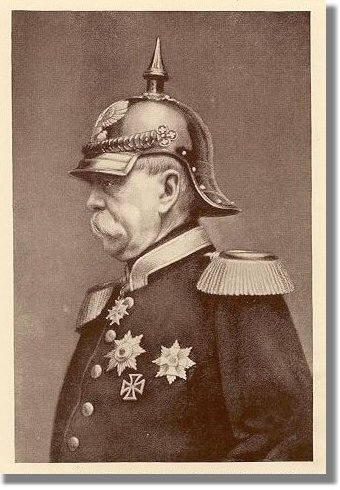
1815 Birth: Otto Von Bismarck: Chancellor of Germany 1866-90:
Otto von Bismarck was born in Brandenburg, Germany in 1815. He studied law and agriculture and in 1847 entered the new Prussian Parliament as a ultra-royalist who was totally opposed to democracy. During the 1848 Revolutions he argued against constitutional reform but as a member of the Federal German Diet at Frankfurt demanded equal rights for Prussians.
Bismarck served as a foreign ambassador in Russia (St. Petersburg: 1859) and France (Paris: 1862). Recalled in 1862 he became President of Prussia. Over the next few years Bismarck helped to reorganize Germany under the leadership of Prussia.
In 1870 Bismarck deliberately provoked the Franco-Prussian War and as a result was able to obtain Alsace and Lorraine from France. To counteract the danger of Russia and France joining forces against Germany, Chancellor Bismarck formed the Triple Alliance in 1879.
Bismarck dealt severely with trade unionists but in an effort to reduce the appeals of socialism, Bismarck he introduced the world's first modern welfare scheme which provided sickness, accident and old age benefits (1883-87).
After a dispute with Kaiser Wilhelm II, Bismarck resigned from office in March, 1890. Otto von Bismarck, who spent the rest of his life in retirement, died in 1898.
1899 Birth: Gustavs Celmins: politician, Latvian fascist leader. After the Soviet invasion of Finland he fought as a volunteer in the Winter War for the Finns. After the end of the war he moved to Germany. In July 1941, accompanied by Nazis he returned to Latvia and regained leadership of Perkonkrusts. On March 14, 1944 he was arrested by the Gestapo for underground activities and sent to concentration camps. Liberated by American 5th army.
1906 Birth: Alexander Sergeyevich Yakovlev: Russian engineer and airplane designer:
He designed the Yakovlev military aircraft and founded the Yakovlev Design Bureau. Yakovlev was a founder of Soviet aviation modeling, air gliding, and aviation sport. He built the AVF-10 glider in 1924 and ultralight aircraft AIR-1 in 1927. These were his very first aircraft used for sport and training.
1916 World War I: Gefreiter Adolf Hitler endures trench warfare in Flanders (Artois) with 3 Company, 16 Reserve Infantry Regiment [List Regiment]. [For further details, Click here.]
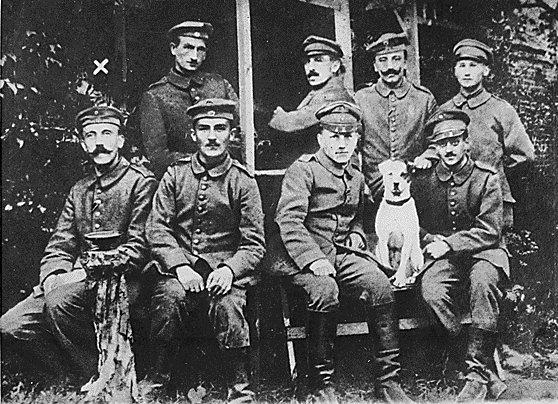
1917 World War I: Various:
Gefreiter Adolf Hitler's 16 Reserve Infantry Regiment [List Regiment] , 3 Company, fortify trenches near Arras. [For further details, Click here.]
Theobald von Bethmann-Hollweg: From the text of the German Chancellor 's response to news that US President Woodrow Wilson is to appear before the US Congress on 2 April 1917 to seek authorisation for a declaration of war with Germany (Click here to read Britain's response to Bethmann-Hollweg's note):
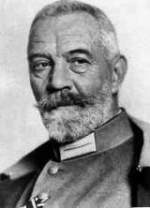
Germany never had the slightest intention of attacking the United States of America, and does not have such intention now. It never desired war against the United States of America and does not desire it today. How did these things develop? More than once we told the United States that we made unrestricted use of the submarine weapon, expecting that England could be made to observe, in her policy of blockade, the laws of humanity and of international agreements. This blockade policy, this I expressly recall, has been called illegal and indefensible.
German Retreat to the Hindenburg Line: comment by US Ambassador to France, William Sharp:
Accepting an invitation, kindly extended to me several days ago, I yesterday visited many of the French towns recently retaken in the invaded territory, making the trip in a military automobile. I was accompanied by military attaché Boyd. I regret to say that I found the various reports in circulation here, and doubtless forwarded to American newspapers, of the deplorable conditions in those towns are in no way exaggerated. With very few exceptions the places visited by me, though few in comparison, numbering upwards of thirty, had been quite destroyed by the Germans before evacuating them. The destruction wrought in the larger towns of Roye, Ham, and particularly the once thriving and attractive city Chauny, was complete. In many of the other smaller villages scarcely a house remains with its roof intact. A scene of desolation reigns everywhere over the reconquered territory. This is true not alone where the possibly excusable military operations carried out by the Germans protected their retreat, by the blowing up of all the bridges and the destruction of the means of telegraphic and telephonic connections, including portions of railway lines, and the blocking of highways by the felling of many trees, but also where, as far as the eye could see, nearly all the fruit trees had either been cut down or exploded so as to completely ruin them.
1918 World War I: Various:
List Regiment: Gefreiter Adolf Hitler's 16th RIR begins constructing fortified works in difficult defensive positions on an active front with German assault regiments near Fountaine (Montdidier). Adolf Meyer:
In view of the enormous extent of the greatly destroyed territory to our rear, which made bringing up all construction materials almost impossible, this work was effected with the greatest difficulty. In addition the enemy now exerted all force to prevent a further German advance. In violent attacks the united enemy forces tried to throw us back again into the wasteland to our rear. [For further details, Click here.]
RAF founded:
The Royal Air Force (RAF) is formed with the amalgamation of the Royal Flying Corps (RFC) and the Royal Naval Air Service (RNAS). The RAF took its place beside the British navy and army as a separate military service with its own ministry. [For further details, Click here]
1920 Red Scare: Five members of the New York Legislature are expelled for being members of the Socialist Party. They will be legitimately re-elected, but once again will be refused permission to sit in session. (THP)
1922 Death: Emperor Karl I of Austria (and Charles IV of Hungary): Austria-Hungary's last emperor:

Born on 17 August 1887 in Persenbeug Castle, Austria, Karl was a grandnephew of the man he succeeded, the aging Emperor Franz Josef I. He became heir to the throne with the assassination of Archduke Franz Ferdinand on 28 June 1914 (whose own children were barred from rights of succession based upon an agreement undertook by Ferdinand upon his marriage).
A cavalry officer until the outbreak of war in late July 1914, he subsequently took up an appointment as liaison officer, in which capacity he served during the opening Galician campaign. Following promotion he was recalled to court in mid-1915, but returned to active duty in May 1916. On the Italian Front he was given command of a corps before being transferred back to Galicia following the Russian Brusilov Offensive.
His military career was ended by the death of Franz Josef in late 1916; he became Austrian Emperor (Kaiser) on 21 November, and King of Hungary on 30 December. Acutely aware that Austria-Hungary's entry into the First World War (having essentially brought it about) was likely to prove the undoing of the empire, Karl quickly sought a means of negotiating a separate peace with the allies.
Much influenced by his pro-Allied wife, Princess Zita of Bourbon-Parma, Karl sent peace feelers to France through the medium of his brother in law, Prince Sixtus of Bourbon-Parma. Inexpertly managed‑-clumsy even, since he refused to cede any territory to the Italians‑- his efforts were dismissed by the French government, although they were put to handy propaganda use the year during the great German push of Spring 1918 (to the great annoyance of his German allies, who never again trusted the Austro-Hungarian emperor).
Regarded as weak by both political extremes, left and right, Karl nonetheless drew support from political moderates. Karl responded with the appointed of a succession of liberal, reformist prime ministers, pretty much reflecting his own views.
Similarly determined to reform the army, Karl banned flogging, ended duels, called a halt to strategic bombing and limited the widespread use of poison gas; which served merely to infuriate his high command. He also decided to jettison Austria-Hungary's long-standing Chief of Staff, Conrad von Hotzendorf, replacing him with the more pliable Arz von Straussenberg.
It was all too late however. Utterly dependent upon German's military might, Karl's reforms achieved relatively little. With the Germans by now suspicious of Karl and Austria-Hungary generally, the new emperor was essentially coerced into what largely amounted to economic and military union with Germany following a meeting with the German Kaiser, Wilhelm II, at Spa on 11 May 1918.
Karl repeatedly attempted in the second half of 1918 to negotiate peace with the Allies, each time without success. By now it was clear that the tide was turning in favour of the Allied effort. With political extremism growing at home, and nationalism rampant, Karl's attempt at domestic reform‑-the October Manifesto‑-which established a federation of autonomous Austrian states, proved insufficient.
Unusually for a monarch, Karl foresaw and largely accepted the dismantling of his empire - at least initially. On 31 October 1918 he granted permission for his soldiers to join national armies; just under two weeks later, on 11 November, he renounced his constitutional powers. Having done so he then changed his mind, refusing to formally abdicate and instead vainly attempting to drum up royalist support. It was too late.
Forced to seek exile in Switzerland in March 1919 (with the assistance of the British), the Austrian parliament deposed him the following month. He attempted to return to Hungary two years later, but was denied permission on each occasion by the Horthy government.
The last of the Austro-Hungarian emperors died in penury in Madeira on 1 April 1922 of pneumonia at the tragically young age of 34. His wife, Zita, lived for a further 67 years, dying in Switzerland at the age of 96. She wore mourning black to the end.
1924 Adolf Hitler: Beer Hall Putsch sentence:
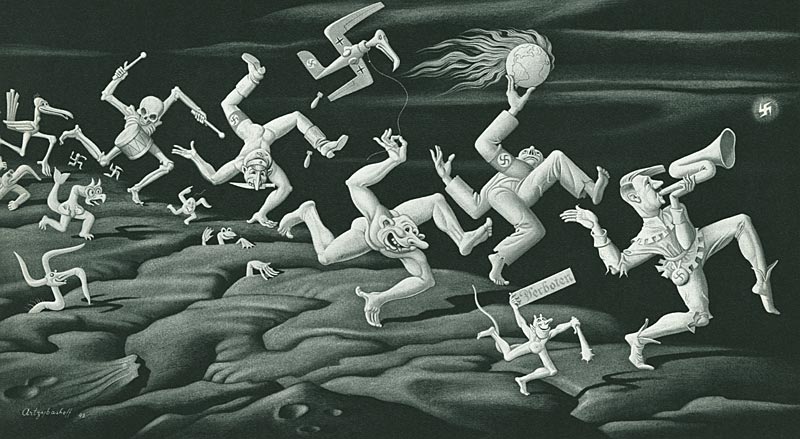
Adolf Hitler is sentenced for his role in the Beer Hall Putsch of November 8, 1923. The attempted coup in Munich by right-wing members of the army and the Nazi Party was foiled by the government, and Hitler was charged with high treason. Despite his conviction, Hitler was out of jail before the end of the year, with his political position stronger than ever.
Germany was in the midst of a national crisis in the early 1920s. After World War I, its economy was in shambles, and hyperinflation caused widespread discontent. Hitler and the Nazis stepped into this breach with often-racist demagoguery that attracted a significant following throughout the nation.
The failed coup turned out to be quite a boon for Adolf Hitler. His trial brought him more attention and publicity than ever before. With a crowd of thousands-including press from around the world-watching the proceedings, Hitler made the most of this opportunity by going on the offensive.
Taking every chance to turn the subject away from the putsch itself, Hitler frequently made speeches about Germany's postwar plight. He blamed the Jews, Marxism, and France for all of the country's problems, repeatedly returning to his theme of hypernationalism. The conservative-leaning judges did nothing to stop Hitler or keep the focus on the attempted coup. The prosecutors, who had been threatened by Hitler's student followers, shrank from challenging the defendant.
It soon became evident that Hitler was winning the public relations battle by using the 25-day trial as a showcase for his extreme right-wing views, even if he was technically losing the case. In his closing argument, Hitler declared that he would ignore the court's verdict because the "Eternal Court of History" would acquit him.
After his conviction, Hitler spent the remainder of the year in prison writing the first volume of Mein Kampf. By the time he was released, he had become more popular than ever, and within eight years he had taken over Germany. (History.com)
1930 Death: Cosima Wagner: daughter of Franz Liszt and wife of Richard Wagner. Although her mother was a descendant of well known Jewish family Bethmann, Cosima was a notorious anti-Semite, even much more than Wagner. She directed the Bayreuth Festival from the death of Richard Wagner (1883) to the outbreak of World War I in 1914. When the Festival re-opened in 1924, it was under the direction of her son Siegfried. She died at age 92 at Bayreuth.
1933 Various:
Church and Reich: The Catholic Teacher Organization publishes a declaration noting with approval that Adolf Hitler and his movement have overcome the un-German spirit which triumphed in the revolution of 1918. (THP)
Jehovah's Witnesses: All their religious literature is banned from circulation in Germany. (THP)
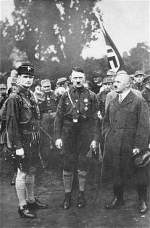
Holocaust: A week into Hitler's dictatorship of Germany, SA men demolish the interior of the Mannheim synagogue, Himmler is appointed chief of the Bavarian Political Police, and Prussian Jews are forbidden to act as notaries public. Goebbels and Julius Streicher organize a one-day boycott of all Jewish-owned businesses in Germany, ushering in the series of anti-Semitic acts that will be collectively known as the Holocaust. (THP)
[See: Did Julius Streicher Deserve his Death Sentence?]1934 Various:

Heinrich Himmler is appointed Reichsfuehrer-SS. (THP)
Holocaust: Jewish shops in Germany are again boycotted:
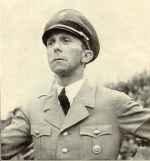
Goebbels:The boycott against the international atrocity propaganda has burst forth in full force in Berlin and the whole Reich. I drive along the Tauentzien Street in order to observe the situation. All Jews' businesses are closed. SA men are posted outside their entrances. The public has everywhere proclaimed its solidarity. The discipline is exemplary. An imposing performance! It all takes place in complete quiet; in the Reich too...In the afternoon 150,000 Berlin workers marched to the Lustgarten, to join us in the protest against the incitement abroad. There is indescribable excitement in the air.
1935 Various:
Austria violates the Treaty of St. Germain by re-instituting compulsory military service.
Treaty Terms:
1. Italy gained the Tyrol and Trentino in the North, and Istria and Trieste in the Northeast. (She did not get Fiume.)
2. Czechoslovakia gained the Sudetenland (German speaking), the Czech provinces and Slovakia.
3.Serbia was given various states in the Balkans: Bosnia, Herzegovina, Croatia and Dalmatia, to form the Kingdom of Yugoslavia (Yugoslavia = The Southern Slavs)
4. Poland gained Galicia.
5. Austria could not unite with Germany (no Anschluss)
6. Austria was disarmed to 30,000 men plus three Danubian police boats.
7. Austria was supposed to pay reparations, but as she was bankrupt in 1920, none were paid.
Jehovah's Witnesses are banned from all civil service jobs and arrested throughout Germany. Pension and employment benefits are confiscated. Marriage to a Jehovah's Witnesses becomes legal grounds for divorce. Children of Jehovah's Witnesses are banned from attending school. Some children taken from parents will be raised in Nazi homes and reform schools. (THP)
1938 Holocaust: Various:
Austria: A number of Jews are sent to Dachau concentration camp.
Danzig: Jewish patients are barred from public hospitals and welfare institutions. All Jewish doctors and nurses are dismissed.
1939 Various:
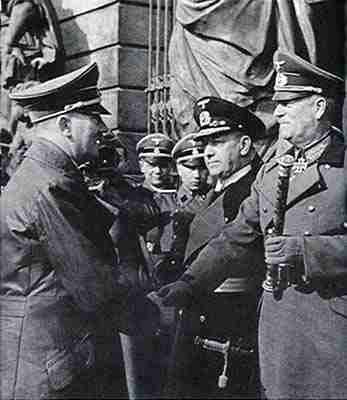
Hitler tells General Wilhelm Keitel that it is a shame that "sly, old Marshal Pilsudski," with whom he had signed a nonaggression pact, had died so prematurely, but the same could happen to him at any time, and that is why it is so important to resolve the problem of East Prussia as soon as possible.
Hitler makes a major foreign policy speech at Wilhelmshaven:
In place of a great number of parties, social ranks, and societies, a single community now has taken its place: The German national community! To bring it to realization and to deepen it more and more is our task. I had to hurt many in this time. However, I believe that the good fortune in which the entire nation is participating today must richly compensate every single one for what he had to give up dearly on his own part. You all have sacrificed your parties, societies, and associations, but you have obtained in return a great strong Reich. And the Reich today, thank God, is strong enough to take your rights under its protection. [For the full text of Hitler's speech, Click here.]

Spain: The United States recognizes the Franco government in Spain following the end of the Spanish Civil War, announced by Generalissimo Francisco Franco when the last of the Republican forces surrendered.
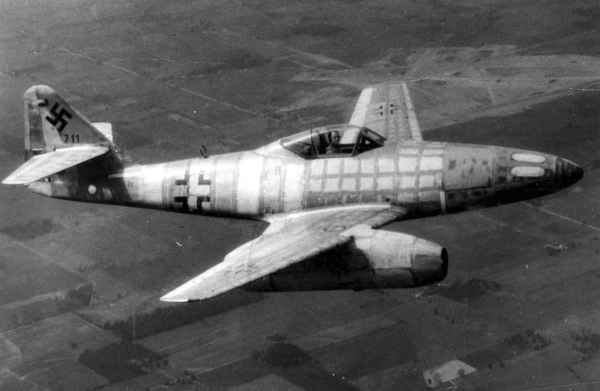
Wunderwaffen: Projekt P.1065: Plans are laid down for what will become the Me 262, the world's first operational turbojet fighter aircraft. [See: Wunderwaffen: Hitler's Deception and the History of Rocketry.]
1940 World War II: Norway: Hitler approves final plans for invasion.
[See: Was Adolf Hitler a 'Great' Military Leader?]1941 World War II: Various:
North Africa: The British withdraw from Mersa Brega, abandoning one of the last defensible positions available.
War at Sea: Blockade Runner Badge for the German navy is instituted.
1942 World War II: War at Sea: The US Navy begins a partial convoy system in the Atlantic.
1944 World War II: Schaffhausen: Accidental American bombing of the Swiss city.
1945 World War II: Various:
U.S. troops land on Okinawa:
After suffering the loss of 116 planes and damage to three aircraft carriers, 50,000 U.S. combat troops of the 10th Army, under the command of Lieutenant General Simon B. Buckner Jr., land on the southwest coast of the Japanese island of Okinawa, 350 miles south of Kyushu, the southern main island of Japan.
Determined to seize Okinawa as a base of operations for the army ground and air forces for a later assault on mainland Japan, more than 1,300 ships converged on the island, finally putting ashore 50,000 combat troops on April 1. The Americans quickly seized two airfields and advanced inland to cut the island's waist. They battled nearly 120,000 Japanese army, militia, and labor troops under the command of Lieutenant General Mitsuru Ushijima.
The Japanese surprised the American forces with a change in strategy, drawing them into the mainland rather than confronting them at the water's edge. While Americans landed without loss of men, they would suffer more than 50,000 casualties, including more than 12,000 deaths, as the Japanese staged a desperate defense of the island, a defense that included waves of kamikaze ("divine wind") air attacks. Eventually, these suicide raids proved counterproductive, as the Japanese finally ran out of planes and resolve, with some 4,000 finally surrendering. Japanese casualties numbered some 117,000. [For further details, Click here]
Italy: The final Allied offensive begins.
Arthur Seyss-Inquart and Albert Speer meet secretly to co-ordinate anti-scorched-earth measures: From Hitler, A Study in Tyranny by Alan Bullock:
Hitler had lost all control over events, and by April he had the greatest difficulty in discovering what was happening. The Germans went on fighting—in the east with the courage of despair—but there was no longer any organized direction of the war. This is amply confirmed by such records as survive of the conferences Hitler held from the beginning of January onwards. Once the operations in the Ardennes had failed, all sense of purpose was lost. The discussions of the military situation in the early months of 1945 are rambling, confused, and futile. The leadership was not only morally, but intellectually, bankrupt. Hours were wasted in discussions of detail and local operations, interrupted by reminiscences and recriminations. Hitler no longer showed any grasp of the situation. His orders became wilder and more contradictory, his demands more impossible, his decisions more arbitrary. His one answer to every proposal was: No withdrawal."
[See: Why Did Hitler Insist on No Surrender?]Churchill to Stalin:
If our efforts to reach an agreement about Poland are to be doomed to failure I shall be bound to confess the fact to Parliament when they return from Easter recess. No one has pleaded the cause of Russia with more fever or conviction than I have tried to do. I was the first to raise my voice on June 22, 1941. It is more than a year since I proclaimed to a startled world the justice of the Curzon Line for Russia's western frontier, and this frontier has now been accepted by both the British Parliament and the President of the United States. It is as a sincere friend of Russia that I make my personal appeal to you and to your colleagues to come to a good understanding about Poland with the Western democracies, and not to smite down the hands of comradeship in the future guidance of the world which we now extend.

Eisenhower to Churchill:

I had never lost sight of the great importance of the drive to the northernmost coast, although your telegram did introduce a new idea respecting the political importance of the early attainment of particular objectives. I clearly see your point in this matter. The only difference between your suggestions and my plan is timing . . . . In order to assure the success of each of my planned efforts, I concentrate first in the Center to gain the position I need. As it looks to me now, the next move thereafter should be to have Montgomery cross the Elbe, reinforced as necessary by American troops, and reach at least a line including Lubeck on the coast. If German resistance from now on should progressively and definitely crumble you can see that there would be little if any difference in time between gaining central position and crossing the Elbe. On the other hand, if resistance tends to stiffen at all I can see that it is vitally necessary that I concentrate for each effort, and do not allow myself to be dispersed by attempting to do all these projects at once. Quite naturally, if at any moment collapse should suddenly come about everywhere along the front we would push forward, and Lubeck and Berlin would be included in our important targets.
[See: The Last Days of the Third Reich.]Eleanor Roosevelt to Maude Gray:
FDR with whom I talked today seems settled in Warm Springs & the rest will do him good. He should gain weight but he hates his food. I say a prayer daily that he may be able to carry on till we have peace & our feet are set in the right direction . . . . Elliot cables that he hopes the end will come soon in Germany. The boys in the Pacific are not so optimistic. All three are there now & I suppose in this battle I can't help worrying about them all, they've been in so long, will their luck hold. (Nash II)
1946 Nuremberg Tribunal: Joachim von Ribbentrop is cross-examined by various counsel:
Ribbentrop: I should like to emphasize that there was not the slightest doubt in either Stalin's or Hitler's mind that, if the negotiations with Poland came to naught, the territories that had been taken from the two great powers by force of arms could also be retaken by force of arms. In keeping with this understanding, the eastern territories were occupied by Soviet troops and the western territories by German troops after victory. There is no doubt that Stalin can never accuse Germany of an aggression or of an aggressive war for her action in Poland. If it is considered an aggression, then both sides are guilty of it. [For the full text of Ribbentrop's testimony, Click here.]
From the letters of Thomas Dodd:Sir David Maxwell-Fyfe is cross-examining Ribbentrop. He did quite well this morning, but now it is dull—too detailed, quite repetitive . . . . We are about through with Ribbentrop—should finish him up by tomorrow and then move on to Keitel and the others. I do think I am making progress at speeding things up.
1948 Cold War: Soviets stop U.S. and British military trains:
Soviet troops stop U.S. and British military trains traveling through the Russian zone of occupation in Germany and demand that they be allowed to search the trains. British and U.S. officials refused the Soviet demand, and the problems associated with the Soviet, British, and U.S. occupation of Germany grew steadily more serious in the following months. [For further details, Click here]
1949 The Soviet Union began mass deportations of over 90,000 people from the Baltic states to Siberia.
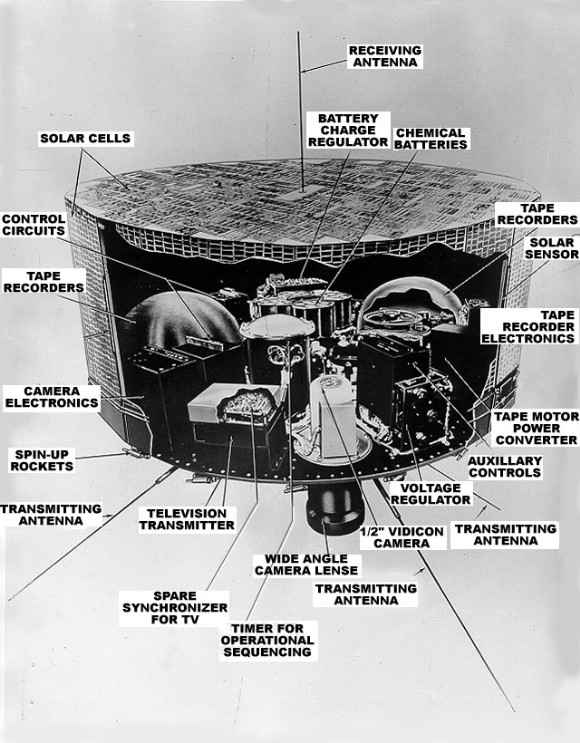
1960 Wunderwaffen: The first successful weather satellite, Tiros 1, is launched by the US.
Edited by Levi Bookin (Copy editor)
levi.bookin@gmail.com



Click to join 3rdReichStudies



Disclaimer: This site includes diverse and controversial materials--such as excerpts from the writings of racists and anti-Semites--so that its readers can learn the nature and extent of hate and anti-Semitic discourse. It is our sincere belief that only the informed citizen can prevail over the ignorance of Racialist "thought." Far from approving these writings, this site condemns racism in all of its forms and manifestations.
Fair Use Notice: This site may contain copyrighted material the use of which has not always been specifically authorized by the copyright owner. We are making such material available in our efforts to advance understanding of historical, political, human rights, economic, democracy, scientific, environmental, and social justice issues, etc. We believe this constitutes a "fair use" of any such copyrighted material as provided for in section 107 of the US Copyright Law. In accordance with Title 17 U.S.C. Section 107, the material on this site is distributed without profit to those who have expressed a prior interest in receiving the included information for research and educational purposes. If you wish to use copyrighted material from this site for purposes of your own that go beyond 'fair use', you must obtain permission from the copyright owner.
Please Note: The list-owner and the moderator of 3rdReichStudies are not responsible for, and do not necessarily approve of, the random ads placed on our pages by our web server. They are the unfortunate price one pays for a 'free' website.